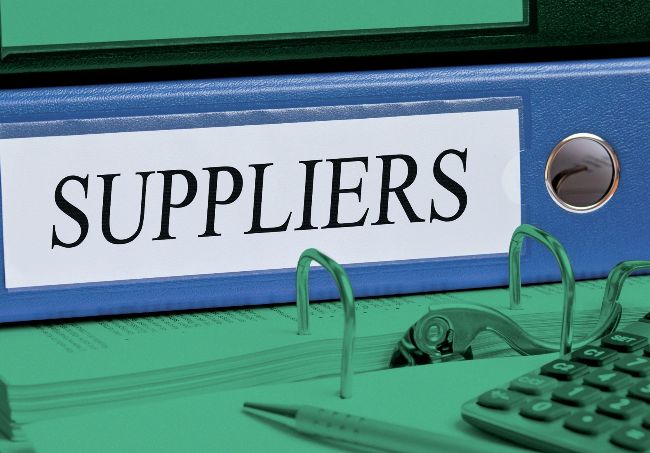BUILDING STRONG DISTRIBUTOR RELATIONSHIPS TO SECURE BETTER DEALS
In a competitive retail market, the strength of your relationships with distributors can make or break your business. By fostering partnerships built on trust, clear communication, and mutual benefit, retailers can secure better pricing, exclusive products, and reliable stock. In this article, we explore how hunting and shooting retailers can create long-lasting, profitable distributor relationships to gain a competitive edge and ensure business success.

IMAGE: SHUTTERSTOCK -
PEOPLEIMAGES.COM - YURI A;
EFFECTIVE COMMUNICATION IS KEY
Effective communication is the cornerstone of any strong distributor relationship. Regular, clear, and professional communication ensures that both parties are on the same page, which ultimately leads to better collaboration and fewer misunderstandings.
Retailers should keep open all lines of communication with their distributors, whether through emails, phone calls, or in-person meetings. Keeping distributors updated about changes in demand, upcoming promotions, or shifts in consumer preferences helps them prepare better for product supply, thereby strengthening the overall relationship.
To further improve communication, retailers can establish a routine for regular updates. This could include monthly check-ins or quarterly business reviews to discuss performance metrics, upcoming needs, and market trends. This proactive approach helps build trust and shows that the retailer is committed to a partnership that benefits both sides.
Example: If a retailer anticipates an increase in sales during a hunting season, informing distributors well in advance of this development will allow them to allocate adequate stock, preventing any supply shortages.
ESTABLISH TRUST AND TRANSPARENCY
Trust is the foundation of any successful partnership. Distributors are more likely to offer favourable terms, pricing, or exclusive deals to retailers who have proven to be trustworthy, reliable, and transparent.
One key way to build trust is by maintaining honesty in all business dealings, paying invoices on time, and fulfilling their commitments.
Retailers should also be transparent about their expectations. Clearly outlining product needs, order quantities, delivery schedules, and pricing expectations from the start helps distributors meet those demands efficiently, creating a smoother and more productive working relationship.
Example: A retailer who keeps a distributor informed of their seasonal sales trends enables the distributor to better forecast and prepare for demand, reducing the risk of overstocking or stockouts.
UNDERSTAND DISTRIBUTOR PRIORITIES AND CONSTRAINTS
Retailers who understand their distributors' priorities and constraints can navigate their partnerships more effectively. Just as retailers have challenges — such as inventory management, customer demand fluctuations, or cash flow issues — distributors also face their own set of limitations.
By gaining a deeper understanding of a distributor’s business, retailers can position themselves as valuable, supportive partners. For example, if a distributor is experiencing manufacturing delays or struggles to meet demand due to raw material shortages, retailers can plan their orders accordingly and offer assistance in spreading the demand over a longer period.
Retailers should be aware that sometimes distributors are dealing with issues that are out of their control. Understanding these circumstances and remaining patient during tough times can go a long way in maintaining a strong, collaborative relationship.
Example: If a distributor is unable to meet an urgent order deadline due to manufacturing delays, a retailer can show flexibility by extending the deadline or accepting a partial shipment, building goodwill and understanding.
NEGOTIATE WIN-WIN DEALS
Negotiation is an essential part of any retail-distributor relationship. While retailers naturally seek the best possible price, distributors aim to maintain profitability. However, it is important for both parties to see the benefits of the deal.
Effective negotiation should focus on finding a mutually beneficial solution. Retailers can negotiate better pricing by offering distributors long-term commitments, such as ordering in larger volumes, agreeing to exclusive product lines, or extending payment terms. These deals offer more security for distributors while providing retailers with better pricing and favourable terms.
Retailers can also leverage their own value as a customer. For example, a large retailer who is able to move significant volumes of a product may be able to negotiate more competitive rates or secure early access to new products. Distributors appreciate having reliable customers, so establishing oneself as a dependable and committed partner can result in preferential treatment in pricing and stock availability.
Example: A retailer might negotiate a deal that offers better pricing in exchange for exclusive rights to sell a distributor’s product for a set period of time in a specific geographic area.
LOYALTY AND CONSISTENCY
Loyalty plays an important role in building strong distributor relationships. Distributors value consistent business and are more likely to offer favourable pricing, early product releases, and priority access to stock when they know a retailer is loyal.
Retailers who demonstrate their loyalty through consistent ordering, prompt payments, and ongoing communication create a sense of stability and trust with distributors. In turn, distributors are more inclined to offer their best deals, as they know they have a reliable partner in the retailer.
Loyalty can also be demonstrated by providing distributors with long-term sales forecasts, which allow them to plan better for production schedules and stock management. A retailer who shows that they understand and respect the distributor’s business is far more likely to secure better terms and exclusivity.
Example: A retailer who orders regularly from the same distributor and consistently pays invoices on time may receive priority access to limited-edition products or early shipment of seasonal items.
OFFER VALUE IN RETURN
A strong distributor relationship is built on mutual benefit. While retailers may focus on securing better pricing and reliable stock, they should also look for ways to add value to their distributors.
Retailers can provide value by offering support in areas such as marketing or product feedback. For instance, a retailer could assist a distributor by providing insights on how products perform in their specific market or customer base. Additionally, retailers can offer to promote the distributor’s products in store or through social media channels, helping them reach a broader audience.
Retailers who offer value in return are more likely to be seen as valuable partners, which increases their chances of securing better deals. Distributors are likely to reciprocate the value they receive, whether in the form of better pricing, access to exclusive products, or favourable delivery terms.
Example: A retailer might offer a distributor positive customer reviews or product feedback that helps the distributor improve their offerings, strengthening the partnership further.
REGULAR EVALUATION AND FEEDBACK
A healthy distributor relationship requires ongoing attention. Retailers should regularly assess the performance of their distributors and provide constructive feedback. This evaluation can cover aspects such as product quality, delivery timelines, customer service, and overall satisfaction.

IMAGE: SHUTTERSTOCK - DOCSTOCKMEDIA
Retailers should also request feedback from distributors about their own performance. This creates an environment of continuous improvement and helps both parties adjust their strategies for better outcomes.
By conducting regular reviews and evaluations, retailers can identify areas for improvement and strengthen their partnerships. Additionally, these evaluations demonstrate a retailer’s commitment to the long-term success of the relationship, fostering further trust and cooperation.
Example: A retailer could schedule quarterly business reviews with distributors to discuss sales performance, inventory challenges, and opportunities for collaboration in the future.
BUILDING RELATIONSHIPS BEYOND PRICE
While pricing is a key component of distributor negotiations, strong relationships go beyond just securing a low price. Retailers should look for ways to add value to their distributor relationships beyond price alone.
For example, retailers might request exclusivity on new products before they are launched to the public or negotiate for more favourable credit terms. Distributors may be willing to offer these benefits because the retailer has shown long-term loyalty and commitment.
By focusing on building relationships that are mutually beneficial beyond pricing, retailers can differentiate themselves from competitors and create long-lasting partnerships that yield more than just discounts.
Example: A retailer could work with a distributor to create a joint marketing campaign to promote a new product launch, benefiting both parties by increasing sales and visibility.
LEVERAGING TECHNOLOGY TO STREAMLINE DISTRIBUTOR RELATIONSHIPS
Integrating technology into distributor partnerships can significantly enhance communication and efficiency. Retail management software and inventory tracking systems can automatically update distributors on stock levels, reducing the risk of overselling or stockouts. Implementing an order management system that shares data with distributors allows for real-time updates and quicker response times.
Additionally, using shared digital platforms for collaboration, such as project management tools or dedicated communication apps, can facilitate smoother interactions and quicker problem resolution.
Example: A retailer using a cloud-based inventory management system can set up automatic notifications to alert their distributor when stock levels of key products fall below a set threshold. This proactive approach allows the distributor to plan restocking before the retailer even places a formal order, preventing potential supply issues. Additionally, using a shared project management tool to track larger or custom orders reduces the need for frequent check-ins, streamlining communication and minimising delays. This approach not only saves time but also strengthens distributor relationships by keeping both parties informed and aligned.
QUICK CHECKLIST:
Building Strong Distributor Relationships
• Communicate regularly and clearly.
• Be transparent about expectations and needs.
• Understand distributor challenges and show flexibility.
• Negotiate for mutual benefit. •Demonstrate loyalty through consistent ordering.
• Offer value in return, such as market insights or promotion support.
FINAL THOUGHTS
Building strong distributor relationships is a crucial strategy for retailers in the hunting and shooting industry. By focusing on effective communication, trust, negotiation, loyalty, and adding value to the relationship, retailers can secure better pricing, exclusive products, and reliable stock. These partnerships are the foundation for sustained business growth, competitive advantages, and a stronger position in the marketplace.
Retailers who invest in nurturing these relationships will not only achieve better terms but also unlock the potential for greater collaboration, early access to new product lines, and more opportunities for innovation.
In a rapidly changing market, where customer expectations and industry standards evolve constantly, a strong relationship with distributors can offer stability and adaptability.
Retailers who demonstrate loyalty, consistency, and value creation will be more likely to withstand market fluctuations and capitalize on emerging trends.
As such, investing time and effort into forging lasting, positive distributor relationships will provide long-term benefits for both parties and pave the way for a thriving business.
We’d love to hear your thoughts on the topics discussed in this article.
Please send your comments to editorial@twsgroup.com